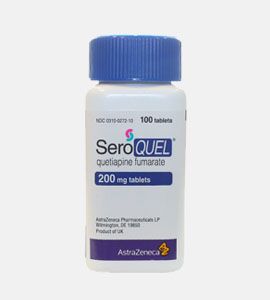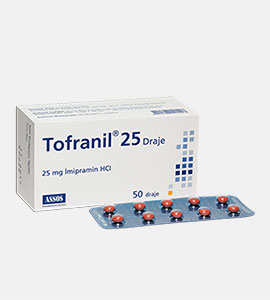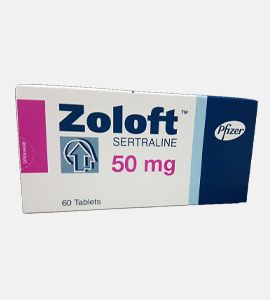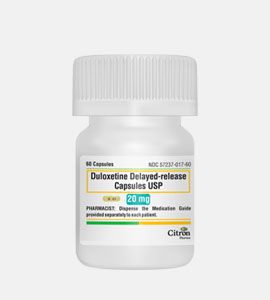Description
Common use
Seroquel is an oral antipsychotic (neuroleptic) medication used for treating schizophrenia and acute manic episodes associated with bipolar I disorder. It shows more affinity with serotonin receptors (5-HT2) than with dopamine receptors D1 and D2 in the brain. It also active toward the alpha 1 adrenoreceptor and less active toward alpha 2 adrenoreceptor. Duration of binding with 5-HT2-serotonin and D2 dopamine receptors is less than 12 hours. Mechanism of Quetiapine action is unknown. Though it is supposed that the therapeutic effect is mediated through a combination of dopamine type 2 (D2) and serotonin type 2 (5HT2) receptor antagonism. This medication is used to treat acute and chronic psychosis also ones in patients with schizophrenia.
Dosage and direction
Seroquel should be taken twice or thrice daily with or without food with a full glass of water. Swallow the tablet whole, do not crush or chew an extended-release tablet. A daily dose of four first therapeutic days is 50 mg, 100 mg (second day), 200 mg (third day), 300 mg (fourth day). Starting from the fourth day the dosage should be adjusted to the level of effective one (which can reach 750 mg daily). In patients with liver or kidney failure, the initial dose is 25 mg/day increased gradually by 25-50 mg till the effective dose is reached. Take exactly as prescribed by your physician and do not exceed the recommended dose.
Precautions
This medication affects the ability to the high concentration of attention so it may affect your ability to drive a car or operate machinery. Before to take Seroquel to notify your doctor if you have liver or kidney disease, heart disease, high blood pressure, heart rhythm problems, heart attack or stroke in history, a history of low white blood cell counts, a thyroid disorder, high cholesterol or triglycerides, a personal or family history of diabetes, trouble swallowing, as you may need your dosage to be adjusted or pass special safety tests for this medication.
Contraindications
Hypersensitivity, pregnancy, breastfeeding. Seroquel should be used with cautiousness in patients with hypotension, epilepsy and epileptic seizures in history. Seroquel may contribute to the development of heart failure, pneumonia, sudden death, in older adults with conditions caused by dementia.
Possible side effect
Seroquel antagonism of adrenergic a1 receptors may explain the orthostatic hypotension observed with this drug. Most common and frequent adverse effects of Seroquel are headache, agitation, dizziness, drowsiness, weight gain and stomach upset. Long term use of this medication may cause irreversible tardive dyskinesia, a neurologic disease which consists of involuntary movements of the jaw, lips, and tongue. Other side effects concern nervous system: headache, anxiety, fatigue, hostility, agitation, insomnia, tremors, convulsions, depression, neuroleptic malignant syndrome (hyperthermia, muscle rigidity, altered mental status, the lability of the autonomic nervous system increased activity of CPK). Adverse effects of Quetiapine for cardiovascular system are tachycardia, prolongation of the interval QT. Dryness of the oral mucosa, nausea, vomiting, abdominal pain, diarrhoea or constipation, increased activity of "liver" transaminases, pharyngitis, rhinitis may also appear. Allergic reactions such as skin rash, eosinophilia are also not excluded.
Drug interaction
Phenytoin (Dilantin) and thioridazine (Mellaril) decrease absorption of Seroquel in intestines and decrease its effects. Seroquel interacts with narcotic pain relievers, medications for hypertension interact with and their activities add oxycodone and acetaminophen (Percocet, Roxicet, Tylox, Endocet), barbiturates, alprazolam (Xanax), clonazepam (Klonopin), ethanol, prazosin (Minipress) and terazosin (Hytrin). Toxicity of Quetiapine may increase if it is co-administered with the drugs able to influence work of cytochrome P450 which is responsible for the metabolism of Seroquel, these drugs are ketoconazole (Nizoral), itraconazole (Sporanox), fluconazole (Diflucan), erythromycin, clarithromycin (Biaxin), nefazodone (Serzone), verapamil (Calan, Isoptin, Verelan), diltiazem (Cardizem, Tiazac, Dilacor).
Missed dose
Take the missed dose as soon as you remember. If it is almost time of your next dose just skip the missed dose and return to your schedule. Do not double dose this medication to make up the missed dose.
Overdose
If you took too much of Seroquel you may experience such symptoms: extreme drowsiness, fast heart rate, feeling light-headed, or fainting. If you suppose that took too much for this medication seeks for immediate medical help.
Storage
Store Seroquel at room temperature, 15-30 C (59-86 F) away from sunlight, moisture, children and pets.



